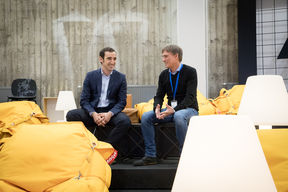Working as a researcher is ’like playing with your favorite toy but you get paid for it’

Which career path should I select: practical or academic? This question pops up in the mind of almost every university student in some point.
Friedrich Simmel and Francesco Ricci are researchers who never really dreamt of becoming academics. Despite that, they are now successful researchers and pioneers of their field, DNA nanotechnology. Simmel works as a professor at the Physics Department of the Technical University of Munich. Ricci is an associate professor at the Chemistry Department of the University of Rome, Tor Vergata.
Both researchers visited Aalto University in the end of May, as they were invited to talk at Nantech2019, a three-day workshop on nucleic acid nanotechnology. The event was organized by Assistant Professor Anton Kuzyk from the Department of Neuroscience and Biomedical Engineering, Professor Pekka Orponen from the Computer Science Department, and Docent Veikko Linko and Associate Professor Mauri Kostiainen from the Department of Bioproducts and Biosystems.
Francesco Ricci did not think of becoming a researcher before his doctoral studies. ‘I didn’t want to be a scientist. I wanted to be a football player! During my first years at the university, I wasn’t a particularly brilliant student. However, when I did my master’s thesis and then PhD, it all changed. I got very interested in what I was doing.’
Friedrich Simmel admits – laughing – that he initially ended up in research because he kept on postponing the decision ‘to do something useful and get a real job.’ For a long time, he was unsure about what exactly he wanted to do. ‘On the other hand, I never really thought of anything else.’
As a researcher, Simmel gets to combine his professional and personal interests. He works with young people, investigates, and discovers new things. For many people, becoming a researcher is their dream for this exact reason; they get to do things they enjoy. ‘It’s like playing with your favorite toy but you get paid for it.’
How to succeed in academia
According to Simmel, becoming a successful scientist calls for curiosity, accuracy, and competitiveness. ‘It’s certainly important that you want to be the first one to do something.’ Also branding yourself or your research is increasingly important in the academic world.
However, being good enough in many things is more important than excelling at just one aspect of the job. If a great programmer cannot give a presentation or write a research paper, they will not succeed as a researcher.
‘One thing is the same for researchers and footballers. It’s not enough to be a good player to get into the national team – you also need luck,’ adds Ricci.
One cannot really influence his or her luckiness, but anyone can aim to make smart choices. Ricci advises doctoral students to select a research group that conducts novel research, publishes frequently, and has funding. A good group also allows its researchers to experience new things, go abroad, and visit conferences.
Francesco RicciIt’s not enough to be a good player to get into the national team – you also need luck.
Smaller groups may be better than very large ones, as in small groups, supervisors often have more time for individual students. ‘When you do your PhD, it’s the starting point of your career. If you choose the wrong lab, you don’t start with the right foot,’ says Ricci.
‘High-profile publications have become increasingly important. You should choose a position where it is possible to write a very good publication,’ adds Simmel.
Benefits to medicine and the environment
Ricci and Simmel work in a multidisciplinary field. At university, Ricci’s major was chemistry, while Simmel studied physics. Although they focus on different aspects of DNA nanotechnology, their work comes with potential biomedical applications.
Ricci uses DNA as a building material for nanoscale devices that can respond to biological markers. These devices can facilitate making medical diagnoses. ‘We can use them to detect antibodies. Antibodies can be diagnostic markers for many diseases, including cancer.’
At Nantech2019, Simmel talked about whether principles of DNA nanotechnology can be applied by switching RNA molecules inside of cells to influence biological processes. ‘Many diseases are associated with these things. Using cells, you could make sensors that sense diseases or release molecules that cure diseases.’
This type of research could also come with other benefits for the society. ‘If you could learn to make bacteria or other cells produce useful things, they could do that in an environmentally friendly way. This would help to reduce, for instance, carbon dioxide or other greenhouse gas emissions.’
Read more news

VTT, Aalto University and GTK: How to ensure Finland captures the multi‑billion growth potential of mineral economy
Finland is rising to the forefront of the mineral economy through new research initiatives and closer collaboration
Significant donation to boost pavement engineering research and education
Companies and associations in the field have donated €400,000 to the School of Engineering.
‘Mesoscale’ swimmers could pave way for drug delivery robots inside the body
Researchers have discovered how tiny organisms break the laws of physics to swim faster — such secrets of mesoscale physics and fluid dynamics can offer entirely new pathways for engineering and medicine.






